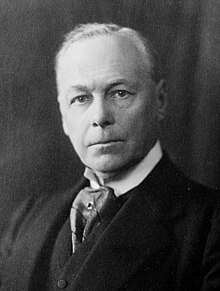William Joynson-Hicks, 1st Viscount Brentford
|
The Right Honourable The Viscount Brentford PC PC (NI) DL |
|
|---|---|

William Joynson-Hicks in 1923
|
|
| Home Secretary | |
|
In office 7 November 1924 – 5 June 1929 |
|
| Prime Minister | Stanley Baldwin |
| Preceded by | Arthur Henderson |
| Succeeded by | J. R. Clynes |
| Minister of Health | |
|
In office 27 August 1923 – 22 January 1924 |
|
| Prime Minister | Stanley Baldwin |
| Preceded by | Neville Chamberlain |
| Succeeded by | John Wheatley |
| Financial Secretary to the Treasury (Office in Cabinet) | |
|
In office 25 May 1923 – 27 August 1923 |
|
| Prime Minister | Stanley Baldwin |
| Preceded by | Archibald Boyd-Carpenter |
| Succeeded by | (from 5 October 1923) |
| Personal details | |
| Born |
23 June 1865 Plaistow Hall, Kent |
| Died |
8 June 1932 (aged 66) London |
| Nationality | English |
| Political party | Conservative |
| Spouse(s) | Grace Lynn Joynson (d. 1952) |
William Joynson-Hicks, 1st Viscount Brentford PC PC (NI) DL (23 June 1865 – 8 June 1932), known as Sir William Joynson-Hicks, Bt, from 1919 to 1929 and popularly known as Jix, was an English solicitor and Conservative Party politician, best known as a long-serving and controversial Home Secretary from 1924 to 1929, during which he gained a reputation for strict authoritarianism.
Born William Hicks, he was the eldest of four sons and two daughters of Henry Hicks, of Plaistow Hall, Kent, and his wife Harriett, daughter of William Watts. Hicks was a prosperous merchant and senior evangelical Anglican layman who demanded the very best from his children. William Hicks was educated at Merchant Taylors' School, London. After leaving school, he was articled to a solicitor between 1881 and 1887, before setting up his own practice in 1888. Initially he struggled to attract clients, but Henry Hicks became associated with the London General Omnibus Company and this connection gained his son much legal work. It also made him an early authority on transport law, particularly motoring law. He was a founder member of The Automobile Association and served as its chairman for fifteen years. In 1894 while on holiday, he met Grace Joynson, the daughter of a Lancashire silk manufacturer. They were married the following year, Hicks subsequently adding his wife's maiden name to his own.
He joined the Conservative Party (at that time part of the Unionist coalition, which name it retained until 1925) and unsuccessfully contested seats in Manchester in the general elections of 1900 and 1906, but was elected in a by-election in 1908. Winston Churchill was obliged to submit to re-election in Manchester North West after his appointment as President of the Board of Trade, as the Ministers of the Crown Act 1908 required newly appointed Cabinet ministers to re-contest their seats. As Churchill had crossed the floor from the Conservatives to the Liberals in 1904, the Conservatives were disinclined to allow him an uncontested return. Joynson-Hicks was adopted against him and in a high-profile campaign defeated Churchill. This provoked a strong reaction across the country with The Daily Telegraph running the front page headline "Winston Churchill is OUT! OUT! OUT!" This election was notable for both the attacks of the Suffragette movement on Churchill, over his refusal to support legislation that would give women the vote, and Jewish hostility to Joynson-Hicks over his support for the controversial Aliens Act.
...
Wikipedia
